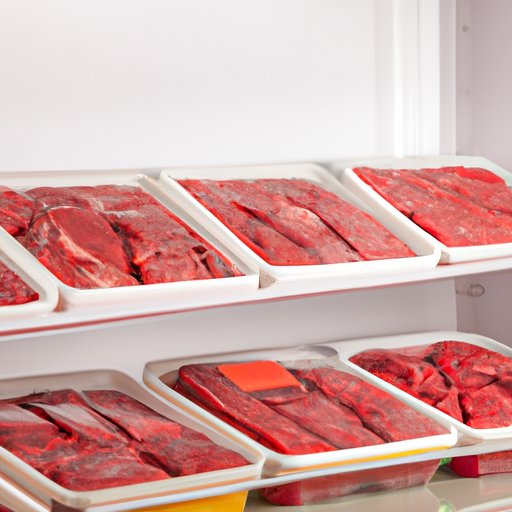Introduction
Beef is a type of red meat that is derived from cows and other bovines. It is one of the most popular meats around the world, as it is an excellent source of protein, iron, and other essential vitamins and minerals. But what if you don’t want to cook all of your beef right away? Freezing it is a great option for preserving its freshness and ensuring that it will last for a longer period of time.
Exploring the Shelf Life of Frozen Beef: How Long Can You Keep It?
The shelf life of frozen beef depends on a few factors, such as the type of beef, the quality of the packaging, and the temperature at which it is stored. Generally speaking, frozen beef can last anywhere from six months to a year. However, it is important to note that ground beef has a much shorter shelf life than other cuts of beef, and should generally be consumed within two to three months.
When it comes to different types of beef, the recommended storage times are as follows:
- Ground beef: 2-3 months
- Steaks: 6-12 months
- Roasts: 4-12 months

How to Store Beef in the Freezer: Maximizing Its Freshness and Longevity
When it comes to storing beef in the freezer, there are a few things you should keep in mind. First, it is important to ensure that the beef is packaged properly. This means using airtight containers or bags that are designed specifically for freezing food. Additionally, it is important to consider the temperature of the freezer when storing beef. Most freezers should be set to 0°F (-18°C) in order to ensure that the beef stays fresh for as long as possible.
Another option for preserving the freshness and longevity of beef is vacuum sealing. This involves using a special machine to remove all of the air from the package, creating an airtight seal that prevents oxidation and keeps the beef fresher for longer. Vacuum sealing is also a great way to reduce freezer burn, as it prevents moisture loss and helps maintain the flavor and texture of the beef.
Freezing Beef: A Guide to Prolonging Its Freshness and Quality
Before freezing beef, it is important to prepare it properly. This means trimming any excess fat and removing any bones, as these can affect the taste and texture of the beef. Additionally, it is important to make sure that the beef is completely thawed before freezing. If it is not, it can cause ice crystals to form, which can damage the flavor and texture of the beef.
Once the beef is prepared and ready to be frozen, there are a few tips that can help to maximize its quality. First, make sure to use containers that are designed for freezing food. These containers are airtight and can help to prevent freezer burn and oxidation. Additionally, it is important to label all containers with the date that the beef was frozen. This will help you keep track of the expiration date and make sure that the beef is still safe to eat.
Does Freezing Beef Impact Its Shelf Life?
Freezing beef does not necessarily impact its shelf life, but it can have an effect on its nutritional content and flavor. Over time, some of the vitamins and minerals in the beef may degrade due to exposure to air and light. Additionally, freezing beef can cause some of the fat to separate, which can affect the flavor and texture of the beef.

Tips for Storing Beef in the Freezer to Preserve Its Quality
When it comes to storing beef in the freezer, there are a few tips that can help to preserve its quality. First, it is important to label all containers with the date that the beef was frozen. This will help you keep track of the expiration date and make sure that the beef is still safe to eat. Additionally, it is helpful to use an inventory system so that you can easily keep track of what you have in the freezer. Finally, it is important to check for signs of ice crystal formation, which can indicate freezer burn.

How to Make Sure Your Frozen Beef Is Safe to Eat: An Overview
In order to make sure that your frozen beef is safe to eat, it is important to take a few precautionary steps. First, inspect the beef for any signs of spoilage. Additionally, make sure to check the temperature of the freezer to make sure that it is cold enough to keep the beef fresh. Finally, it is important to follow the guidelines for reheating and refreezing beef, as this can help to minimize the risk of foodborne illness.
Conclusion
Beef is a delicious and nutritious option for meals, but if you don’t want to cook it all at once, freezing it is a great way to preserve its freshness and quality. With proper storage techniques and an understanding of how long frozen beef can last, you can enjoy your favorite cuts of beef for months to come. Just remember to inspect the beef for any signs of spoilage, check the temperature of the freezer, and follow the guidelines for reheating and refreezing to ensure that your beef is safe to eat.


